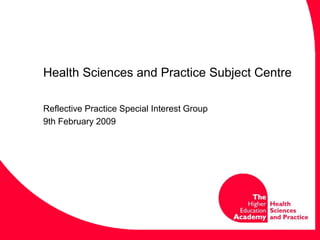
Teaching Reflexivity Strategies Assessment Theories
- 1. Health Sciences and Practice Subject Centre Reflective Practice Special Interest Group 9th February 2009
- 3. Bridging the divide between doing and teaching reflexivity by examining how we have learnt to use reflexivity in our own areas of practice
- 4. “Critical reflective knowing is neither behavioural nor technical, not truth establishing, nor captured by a discipline. It critiques all other forms of knowledge, and in so doing, it moves beyond merely reproducing what is” (Habermas, 1978)
- 5. Key issues for teaching reflexivity 1. Strategies and techniques 2. Theories and approaches 3. Assessment and monitoring 4. Professional knowledge and development
- 6. My learning about reflexivity
- 7. Reflective note book {Trigger (App3/Date:21.07.06): A conversation with a Supervisor} My views have changed they will again. Where will this lead? What is there after this? Have I initiated a way of thinking that is just over- stimulated reflexivity? Is introspection a way of researching? Is my agenda overly personal – emancipatory, therapeutic? Am I researching me?
- 8. Being reflective involves picturing or “visualizing oneself” (Stronach 2007)
- 9. Reflective tools Reflective writing • Learning journals, diaries, blogs • Memos, reflective notes, writing prose Reflective summaries • Creating tables, lists or bullet points • Tabulation of themes or issues • Feedback/evaluation forms Diagrammatic representation • Concept map, mind map • Flow charts/diagrams Creative representation • Symbols, icons • Pictures/images, dance • Poetry Audio/recordings • Storytelling, CDs, digital recorder • Video, film-making Perspective taking • Critical incident technique • Peer/stakeholder/service user views • Reflective interview Interaction • Peer- or group-discussion, team work • Action Learning Sets • Service user involvement
- 10. Reflecting on our performance “our novel selves” and “our signature” (Stronach 2007)
- 11. {Trigger (App3/Date:28.08.06): Transcribing interview data} I have such a personal view of my relationship with this study. I feel like I am one of two mirrors. I am pointed at another mirror, which is the study. From my position all I can see is me, reflected in the study... I can see where the study has come from and how my understandings have changed. But, I am in a reflection trap. I am frustrated with looking at the study and at me. It feels overly reflective and out of control. I am mentally going around in circles, scrutinizing every decision that I have made and what I will do next.
- 12. Limitations of reflexivity • Self-indulgence (Finlay 2002) • Difficulties of reflection (Seale 1999) • Paralysis (Weick 1999)
- 13. Reflexivity involves “thinking about the conditions for what one is doing and the affects” (Steier 1991)
- 14. “Research does not take place in a neutral, apolitical, ideology-free space. Nor is an autonomous, value- free researcher responsible for it” (Alvesson and Sköldberg 2000) Oedipal effect Episteme Disciplines Discourse M. Foucault
- 16. “Reflexivity offers critical validation through structured and ongoing attention to personal, interpersonal and contextual factors influencing what is said and done, or not said and done” (Smith 2008)
- 17. Key questions for teaching reflexivity 1. Strategies and techniques • Reflective tools • Pedagogy of reflexivity 2. Theories and approaches • Purposes and uses of reflexivity • Support for position of critical attitude 3. Assessment and monitoring • Embracing and examining subjectivity • Educational relationships e.g. supervision 4. Professional knowledge and development • Monitoring how reflexivity is taught • Stance & style of Reflective teacher
- 18. Reflexivity references Alvesson, M. and Skoldberg, K. (2000). Reflexive Methodology: New Vistas for Qualitative Research. London: Sage Publications. Bolam, B., Gleeson, K. and Murphy, S. (2003) “Lay person” or “Health expert”? Exploring theoretical and practical aspects of reflexivity in qualitative health research. Forum: Qualitative Social Research, 4, 2, Art. 26. Brookfield, S. (1993) Self-directed learning, political clarity and the critical practice of adult education. Adult Education Quarterly, 43(4), pp. 227–242. Breuer, F. and Roth, W. (2003) Subjectivity and reflexivity in the social sciences: Epistemic windows and methodical consequences. Forum: Qualitative Social Research, 4, 2, Art. 25. Dowling, M. (2006) Approaches to reflexivity in qualitative research. Nurse Researcher, 13, 3, 7-21. Finlay, L. (2002). Negotiating the swamp: the opportunity and challenge of reflexivity in research practice. Qualitative Research, 2, 209-230. Finlay, L. (2002) Outing the researcher: The provenance, process, and practice of reflexivity. Qualitative Research, 12, 4, 531-545. Foucault, M. (1982) The subject and power. Critical Inquiry, 8, (4): 777-95. Habermas, J. (1978) Knowledge and Human Interests (second edition). London: Heinemann. Hardy, C., Phillips, N. and Clegg, S. (2001) Reflexivity in organization and management theory: A study of the production of the research ‘subject’. Human Relations, 54, 531-560. Holland, R. (1999). Reflexivity. Human Relations, 52, 463-483. Hsiung, P. (2008) Teaching reflexivity in qualitative interviewing. Teaching Sociology, 36, 211-226. Johnson, P. and Duberley, J. (2003) Reflexivity in management research. Journal of Management Studies, 40, 1279-1303. Leach, L., Neutze, G. and Zepke N. (2001) Assessment and empowerment: some critical questions. Assessment & Evaluation in Higher Education, 26, 4, 293-297. Lewis, M. and Grimes, A. (1999). Metatriangulation: Building theory from multiple paradigms, Academy of Management Review, 24, 672-690. Riley, S., Schouten, W. and Cahill, S. (2003) Exploring the dynamics of subjectivity and power between researcher and researched. Forum: Qualitative Social Research, 4, 2, Art. 40. Smith E. (2008) Appearances of power: service user involvement in health research. PhD thesis. University of London. Stronach, I., Garratt, D., Pearce, C., Piper, H. (2007) Reflexivity, the picturing of selves, the forging of method. Qualitative inquiry, 13, 2, 179-203. Weick, K. (1999) Theory construction as disciplined reflexivity: Tradeoffs in the 90s. Academy of Management Review, 24, 797-806. Woolgar, S. (ed.) (1988) Knowledge and Reflexivity. London Sage: Publications.